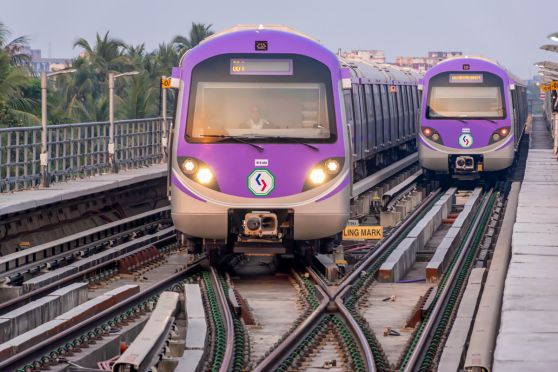The Supreme Court on Wednesday directed no felling or transplantation of trees will take place for the metro rail project near the iconic Victoria Memorial in Kolkata without the permission of the Central Empowered Committee (CEC).
A bench of Justices B R Gavai, P K Mishra and K V Vishwanathan passed the order while hearing a plea challenging a June 20 verdict of the Calcutta High Court.
The high court had dismissed a petition seeking a direction to stop all metro construction in the maidan area, the proposed project site, due to alleged felling and transplantation of a large number of trees.
The apex court observed to allay the apprehension of the petitioner, it would be appropriate that the CEC examined the issue.
"We, therefore, direct that the respondents shall not undertake transplantation or felling of the trees without the permission of the CEC," said the bench and disposed of the plea.
The counsel appearing for petitioner, 'people united for better living in calcutta (PUBLIC)', informed the bench that while they weren't opposed to the metro project, the work regarding one of the stations would entail felling of over 900 trees.
The counsel submitted destroying the environment was not in public interest.
Solicitor General Tushar Mehta, however, said trees were not being felled but transplanted.
He said of the 827 trees required to be transplanted, authorities had transplanted 94 trees.
Mehta further submitted under the compensatory afforestation programme, a total of 2,370 trees would be planted.
He said the metro project was of vital public importance and decongest roads upon completion.
During the hearing, the counsel appearing for West Bengal sought time to get appropriate instructions in the matter.
The bench observed each day's delay would add to the project's cost.
On September 13, the apex court had stalled either tree felling or transplantation till the next hearing.
It had issued notices to the West Bengal government, the Rail Vikas Nigam Limited (RVNL) and others seeking their responses on the plea challenging the high court verdict.
The plea filed in the high court had prayed for an order to stop the construction of the Joka-Esplanade metro project in the maidan area.
The project is partially operational between Joka and Majerhat stations in the south-western suburbs of Kolkata. Completion of the project will provide an important connectivity option to people from these places to the heart of the city.
The 16.7-kilometre Joka-Esplanade metro project will have a 5.05-kilometre underground stretch from Khidirpur to Esplanade, an official had said earlier.
The plea before the high court also sought directions to the metro authorities to call for a review of the proposed project by independent experts in the urban system and transport planning besides setting up an expert committee to examine and submit a report on the feasibility of transplanting the trees.
It had also urged the high court to prohibit the authorities from proceeding with the plan to set up the Victoria metro station.
"Undoubtedly the metro rail project is in public interest. Kolkata has a unique distinction of being the first city in the entire country to have a metro rail project. Another unique aspect is Kolkata being the first city where the underwater metro tunnel was constructed and being successfully put to use," the high court had said.
The high court had, therefore, underlined striking a necessary balance when it came to public interest.
"We are fully conscious of the need to protect ecology and environment," it had added.
The high court had said it was fully convinced that the requisite permission was obtained by the RVNL for the transplantation or felling of trees and the same cannot be termed either arbitrary or unreasonable as it was subject to stringent conditions.
While observing the petitioner had not made out a case, the high court permitted the RVNL to proceed with the project.
Except for the headline, this story has not been edited by The Telegraph Online staff and has been published from a syndicated feed.











